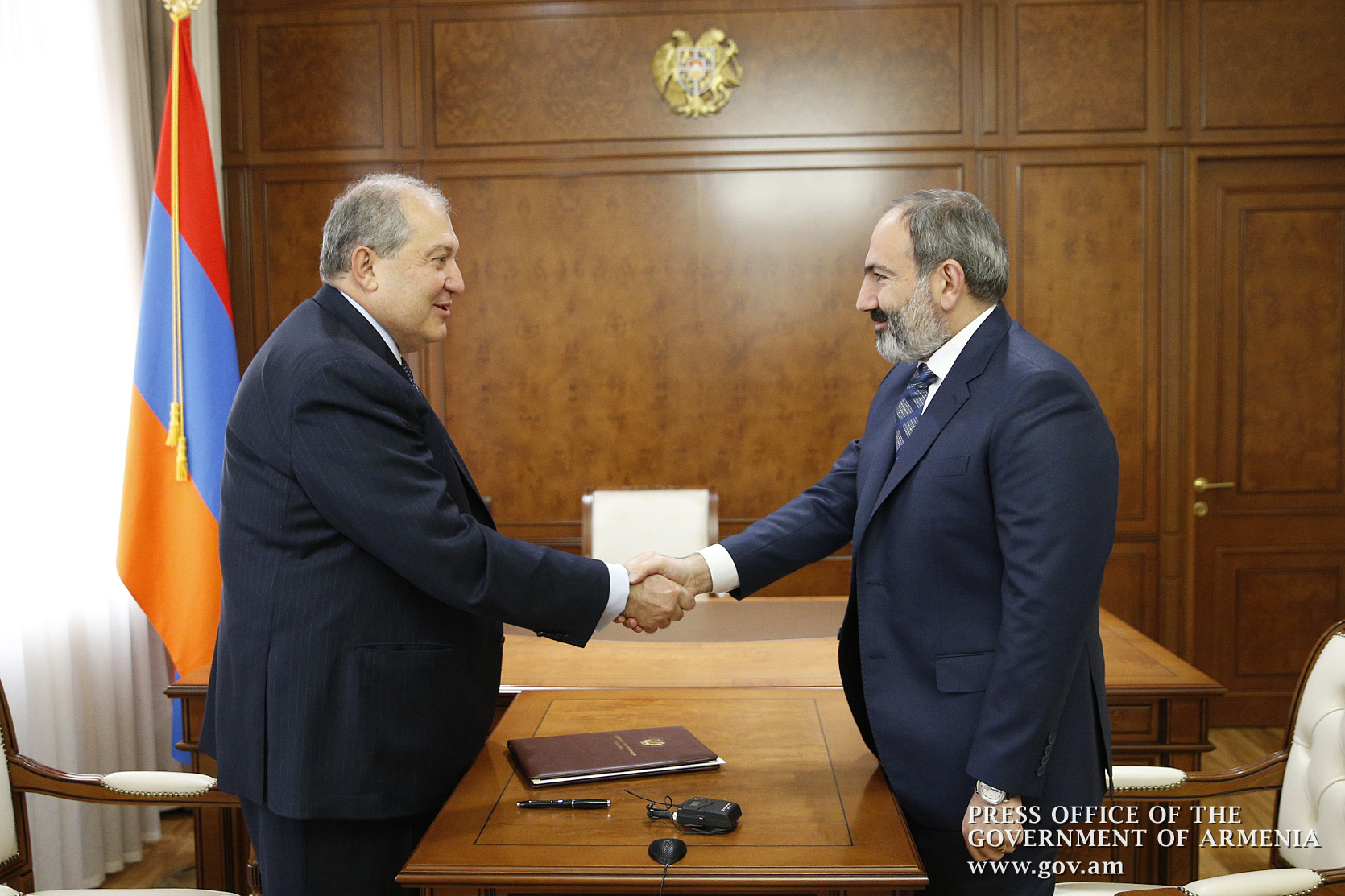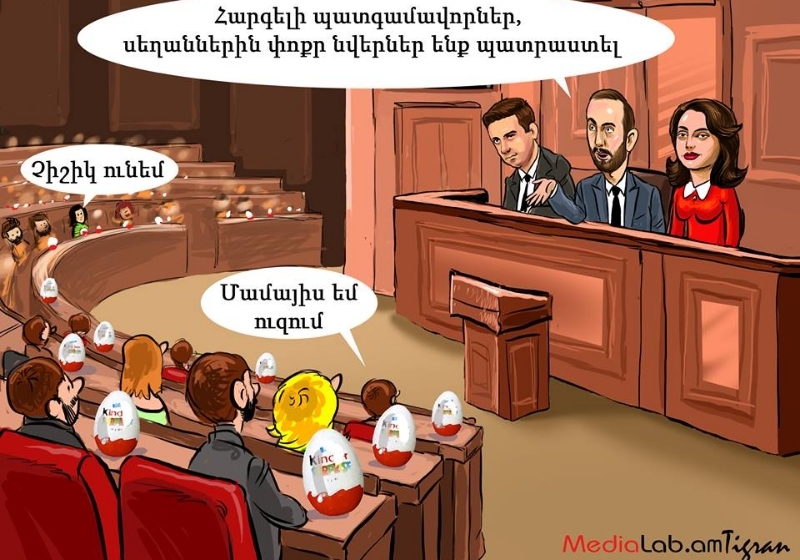YEREVAN—The seventh National Assembly of Armenia officially convened for its first parliamentary session since December’s snap election. Deputies were sworn in last week ahead of Monday’s meeting, completing the peaceful transition of power triggered by the Velvet Revolution of 2018.

At an inauguration ceremony held at the Presidential palace, President Armen Sarkisian formally re-appointed Nikol Pashinyan as Prime Minister. Pashinyan had vacated the position late last year in order to trigger a snap election. The President, whose powers are largely ceremonial according to Armenia’s 2017 constitution, congratulated the Prime Minister at a press event, adding “Your success is our entire country’s success, our people’s success, including mine.”
Pashinyan’s “My Step” coalition won a decisive victory in the December 2018 parliamentary election. The 132 available seats have been proportionally distributed among the three parties which passed the electoral threshold. Due to the 2016 electoral code’s confusing arithmetic, which allowed for the total size of the unicameral body to fluctuate between 105 and 132 seats, the Central Election Commission (CE) finalized the results barely two weeks before Parliament reconvened.
With the Armenian Revolutionary Federation (ARF) and the Republican Party of Armenia (RPA) failing to pass the five percent threshold for Parliamentary representation, “My Step” Alliance increased its showing from five to 88 seats. Prosperous Armenia (PAP) held on to 26 of its 31 seats, while Bright Armenia (BA) added 15 seats for a total of 18. For the first time in the country’s democratic history, women make up a quarter of the Assembly.
Parliament confirmed Ararat Mirzoyan of the Civic Contract party as Speaker. His previous position of First Deputy Prime Minister, originally created with former Prime Minister Karen Karapetyan in mind, has been abolished. Veteran Civil Contract politicians, Lena Nazaryan and Alen Simonyan took their posts as first and second deputy speakers.
Civil Contract announced its intention to back the candidacy of Prosperous Armenia’s Vahe Enfiajian for Third Deputy Speaker. This decision was met with criticism from Bright Armenia leader Edmon Marukyan, who argued that former Minister of Labour, Mane Tandilyan, would be a more qualified choice. The Armenian Constitution reserves the Third Deputy Speaker position to the Opposition.
Civil Contract’s parliamentary majority allows the party to form a government without forming a coalition. Commentators have cast doubts on claims by both Bright Armenia and PAP of forming the legitimate opposition. PAP has entered government coalitions with the RPA in the past but has rarely taken principled stances on any issue. Pashinyan also counted on PAP’s pivotal support to secure his office. Bright Armenia formed part of a coalition with Civil Contract until recently and shares many of its ideological positions.
Ultimately, Civil Contract representatives justified their decision to back the PAP on the grounds that they held the largest non-governmental parliamentary faction.
Since first-time lawmakers make up over three quarters of the new Assembly, commentators have expressed concern over the body’s relative lack of experience. For others, the passing of the torch to a new generation of politicians with no connection to Soviet-era political conventions is a net positive.
With a number of Armenian news outlets live-streaming from the assembly chambers, Armenian social media came to life with discussions on the new appointments, the usual intrigue and humorous takes on the incoming parliamentarians. One political cartoon poking fun at the new Assembly’s younger demographic by comparing Parliament to a kindergarten classroom made the rounds on Facebook.

One MP Gor Gevorgyan created a minor commotion on the Internet when he chose to open his speech with a quote from Paul the Apostle, which he tried to repeat in Krapar (Biblical Armenian) to humorous effect.
As for Pashinyan, the Prime Minister has promised major government restructuring. His government has already signaled its intention to close or merge at least five ministries, including the Ministries of Diaspora and Culture. He also has until the end of this week to announce his picks for cabinet for formal approval. Defense Minister Davit Tonoyan and Foreign Minister Zohrab Mnatsakanian will likely retain their posts. His government is expected to submit a five year policy proposal by February.


Armenia went through a bloodless revolution. Prime Minister played a pivotal political game and came out a winner with flying colors. So far so good, now let us see what are they going to do. They have the clear majority. With all the problems piling up, one wonders if the garbage-dump of old Yerevan is going to cover the whole country.
Garbage-dump will come from Putin if Pashynian does not play Russian lullaby!
The new parliament, if in fact it is the “parliament of Armenia”, should get to work and address the pseudo-alliance and all the violations of Armenia’s sovereignty by “Mother Russia” who just recently had the audacity to raise gas prices on Armenia, (as a political harassment and meddling in Armenia’s affairs) right after taking over Armenia’s gas infrastructure of course, and all the while sitting in Gyumri for free in disguise of “protecting Armenia” but at the same time protecting its own interests and national security for free. So the first item on the agenda in parliament: tell Russia to cut gas prices to a marginal amount, maybe even make it free, or else start paying the rent for the base in Gyumri, and any future gas price increases will result in rent increases at twice the rate.
The message and question that Armenia can pose to Russia is, our nation and our survival is of most importance to us, but don’t think that you have fooled us into believing that you are in Guymri just to “protect us” from Turkey. How much is the security of your own “Mother Russia” worth to you, where you won’t find US/NATO military bases stationed in Azerbaijan with nukes pointed at Moscow? And next the balkanization of “Mother Russia” into a dozen nations?